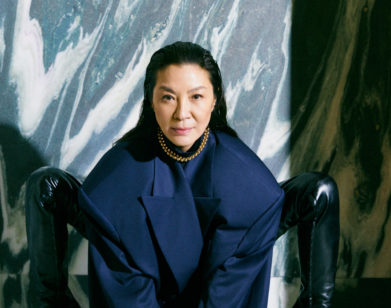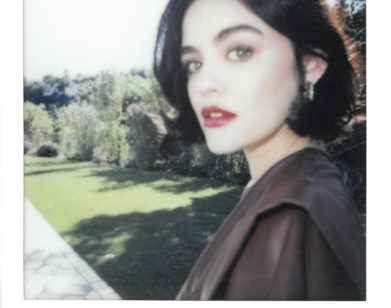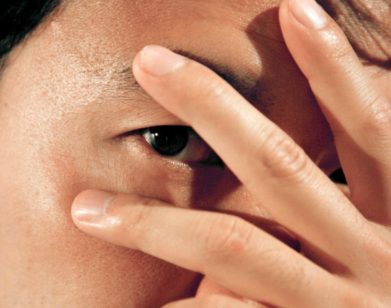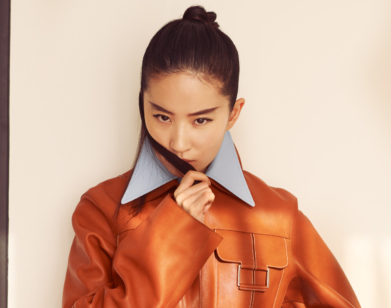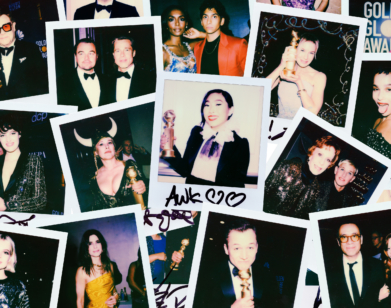BESTIES
Jimmy O. Yang on Kung Fu, Fantasy Football, and Interior Chinatown
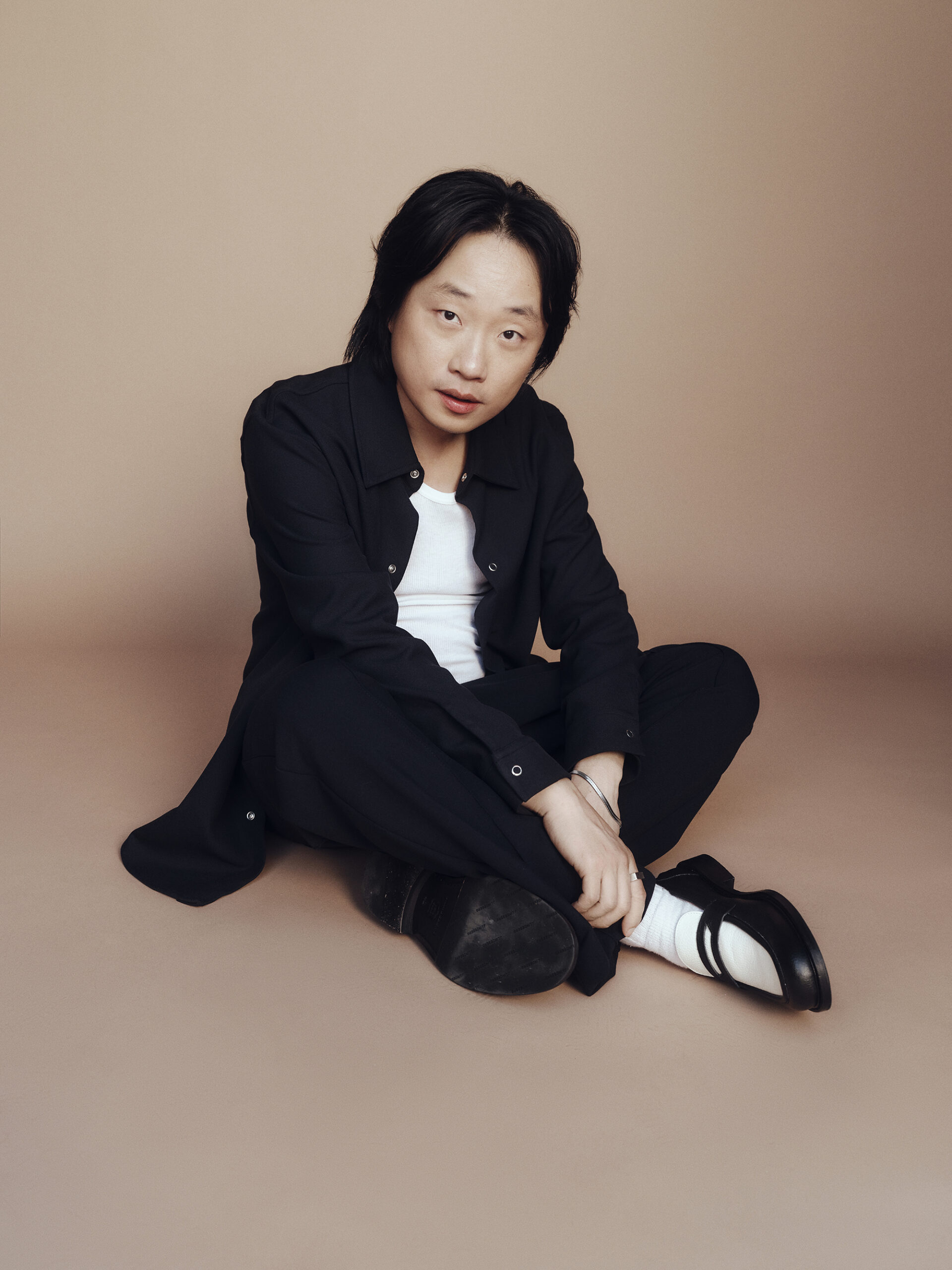
Jimmy O. Yang, photographed by Jonny Marlow.
Jimmy O. Yang has a knack for taking some specific, weirdly universal characters and making them both hilarious and sometimes even profound. You probably first saw him as the scheming Jian-Yang on Silicon Valley, or as the delightfully chaotic Bernard Tai in Crazy Rich Asians. Now, the actor and comic is trying something completely different with Interior Chinatown, Hulu’s take on Charles Yu’s Pulitzer-winning novel, which Yu adapted himself. The show is part-cop show satire, part-family drama, and part-existential fever dream, and Yang is right at the center of it, playing Willis Wu, a “Generic Asian Man” trying to break out of the background and figure out who he’s meant to be. It’s sharp, strange, and deeply personal to the 37-year-old Chinese immigrant. To drink in the moment, he called up his friend and Crazy Rich Asians costar Awkwafina to talk about the show, their friendship, and that time they were denied from a downtown restaurant.
———
AWKWAFINA: Do you remember the first time we met?
JIMMY O. YANG: It was Crazy Rich Asians, right?
AWKWAFINA: Yeah.
YANG: That was the most fun time. It was 20 of us inside of a hotel room.
AWKWAFINA: It was really crazy. And I feel like we hang out now all the time.
YANG: Aside from my high school friends that I’ve known for 20 years, you’re definitely my best friend in the industry.
AWKWAFINA: For sure. And our schedules help, because I don’t really have anyone to hit up in the day. So I like going to lunch with you. When was the last time we saw each other?
YANG: Two days ago. Right here in New York. It was me, you, Ronny [Chieng], BD Wong, MC Jin. That was a good thing.
AWKWAFINA That was a really cool night.
YANG: Yo, should we put that restaurant on blast, the one that wouldn’t let us in?
AWKWAFINA: No, no.
YANG: This stupid-ass restaurant on St. Marks wouldn’t let us in. And I’m like, “Do you know who we are?” [Jokingly] It was very embarrassing.
AWKWAFINA: It was so embarrassing. But also, we were late.
YANG: Yeah, we were late. It’s okay.
AWKWAFINA: So watching Interior Chinatown was so cool, and you give such a nuanced performance. What drew you to it, and how do you think that it fits into this broader view of Asian-American projects?
YANG: First, I got the script. I hadn’t read the book yet and I was just like, “The script is amazing.” The theme from the book is the invisibility of Asians, us stuck in the background, but done in such an interesting, metaphorical way. And then I read the book, and I’m usually not the fastest reader, but I read it in half a day.
AWKWAFINA: It’s such an amazing book in terms of prose. Visually, the show really echoed that vibe.
YANG: And Charlie [Yu’s] a genius. I don’t know about you, but it really resonated with me as an Asian trying to find my identity here, and oftentimes feeling like we’re stuck in the background or in a box that society or our family has put us in. And then it was really weird, because Willis was a background guy, a generic Asian man, and he snuck his way into being the tech guy on the show. And I’m like, “Dude, I went through all of that.” In Silicon Valley, I was a Chinese teenager. I was like, “Wow, did Charlie base his book on me?” And then when we got to shooting the show, every episode seemed so different. Willis will do so much growth in every episode, and I got to pull from all my own experiences.
AWKWAFINA: That’s right.
YANG: Stuck in the background, the strife with his father, trying to discover his brother’s mystery, and then getting pulled out of his home in Chinatown and trying to sneak into the real world—to be a delivery man, to be a tech guy—but still very overlooked. It was really rewarding.
AWKWAFINA: It’s so different. One of my favorite parts about it is how it portrays the complexities of the Asian-American identity, the relationship with our parents, the relationship with the world around us. How do you think it’s going to impact, or add to, Asian-American representation or the way that people look at the generic Asian man archetype?
YANG: What’s cool about the show is it’s grounded in Willis’s journey. He has problems with his father, him and his best friend don’t really see the world the same. If people just follow Willis’s POV and find him relatable, then hopefully we get you to feel psychologically what it feels to be an underdog, to be an Asian-American kind of stuck in the background. Charlie wrote this very well, in a way where it doesn’t rub it in your face like, “Hey, this is trauma.”
AWKWAFINA: Exactly.
YANG: It’s a super entertaining show. There’s kung fu, but done in an ironic way.
AWKWAFINA: It’s very trippy and funny and scary.
YANG: There’s also a mystery. It’s like Law and Order meets The Twilight Zone. And everybody kind of goes through their own journey. Tzi Ma’s character playing my father, he’s kind of like “I just want you to be safe. I just want you to stay out of trouble.” My mother, who’s an older Asian woman, played by the amazing Dianna Lance.
AWKWAFINA: Literally my parents from The Farewell.
YANG: I stole your parents from The Farewell, dude. They’re so good.
AWKWAFINA: So good. It’s a stacked cast, and it was really moving. Are there any ways that you felt conflicted or surprised by your own feelings toward your character’s journey?
YANG: At times, because in a way, after Crazy Rich Asians, I feel like we are all going the right direction. But Willis hasn’t found himself yet. Willis was like me 20 years ago, so I kind of have to go back. And you find that feeling again of not belonging, or going to an audition for the first time for a very generic Asian role—”Chinese teenager number one.”At the same time, as the season progresses, you see that Will is quite flawed. He makes a lot of selfish decisions. He’s saying he’s trying to solve his brother’s mystery to find closure, which is true. But at the same time, he’s leaving his family behind to pursue his own dreams. He’s making choices to hang out with this detective who is beautiful and he has a crush on and leaving his best friend behind.
AWKWAFINA: That’s a good point.
YANG: So, it’s quite conflicting and he makes a lot of selfish choices. And you see in later episodes, it kind of all comes to a head. I don’t want to give too much away.
AWKWAFINA: Yeah, don’t, but that’s really interesting. And I think that’s also evolutionary to make everyone pay for their own decisions, even in a hero arc.
YANG: And it’s weird, right? Because in Asian culture growing up, we have to be very selfless.
AWKWAFINA: Totally.
YANG: You have to do everything for everyone else. Whereas in American culture, it’s like, you go live your dream, blaze your own path, and it’s a very selfish journey. Willis is kind of caught in between that and it’s hard to make everyone happy and yourself happy.
AWKWAFINA: Sometimes, the person that gets in the way of everything that we want is ourselves. I get this a lot, but did you do your own stunts?
YANG: Yes, I did all my own fights. I trained in Wing Chun for three, four months before the shoot. Obviously, that doesn’t make you immediately a master.
AWKWAFINA: Is that how Ronny got into it? He was already doing jiu-jitsu, right?
YANG: He was, I think. Ronny and Chris grew up doing martial arts, but I’d never done it. I grew up playing ping-pong.
AWKWAFINA: I’m going to get skewered for this, but can you describe why Wing Chun is different from other martial arts styles?
YANG: Wing Chun is more close-quarter combat. Like, you block, and then you hit in very small quarters. So my trainer, Daniel Ma, I don’t know if you know him, he was on the Shang-Chi team, I think.
AWKWAFINA: Oh, yeah?
YANG: Yeah. And he would come to my house and train me and it’s like the wooden dummy and things like that. He told me Wing Chun started off as people fighting on boats. That’s why there’s not a lot of movements like northern Kung fu, where you jump, where you do whatever.
AWKWAFINA: Right, because not a lot of space for you to fall.
YANG: But the actual fight scene in the first episode, that jump kick, wasn’t quite Wing Chun, so we mixed different things in. But then there’s a sequence where I’m blocking this girl that’s coming at me, and that was mostly Wing Chun moves.
AWKWAFINA: I mean, it looks sick. I’m seeing you tonight as a part of your Big and Tall Tour. What is that like, to balance a full-blown comedy tour and going into releasing Interior Chinatown?
YANG: I’m dying right now. I am so tired. But it’s okay. I think I’m used to it, and I’ve done it when I was on Space Force where I would go on tour on a weekend and shoot during the week, and work up to a schedule.
AWKWAFINA: It’s very much a “when it rains, it pours” kind of thing.
YANG: How many times has it been for both me and you? We’re like, “Man, we’re so bored. We got nothing going on.” But when we get busy, it’s crazy.
AWKWAFINA: How do you siphon out your energy? I have trouble with that, like getting enough sleep. How do you balance that?
YANG: As busy as I could be, I always try to play video games and go on my Fantasy Football League roster.
AWKWAFINA: Oh, yeah. You love that.
YANG: Just so it balances my energy so I feel like I’m still human.
AWKWAFINA: A person.
YANG: Right. Because if I’m only focused on work 24 hours a day, then I wouldn’t be able to sleep.
AWKWAFINA: It’s hard to be stuck with your own thoughts sometimes.
YANG: Find that balance. And then that makes me chill out as long as I get a good day of sleep. Also, I feel like when you keep going and going, it’s okay. It’s when you stop. That gets really hard. So I’m just trying to keep the momentum going until I collapse.
AWKWAFINA: Well, I think you’re doing a good job, and aside from all of this, you’re also a really great friend, and it’s been really cool to see all this happen. I really think people are going to receive Interior Chinatown. It’s such a well-done show, and you’re really good in it.
YANG: Thank you. I appreciate it. Maybe season two, if we get one, you can reunite with your parents and become a long-lost sibling or something.
AWKWAFINA: Oh yeah, we’ll adapt it from Interior Chinatown 2. It would be an honor.

